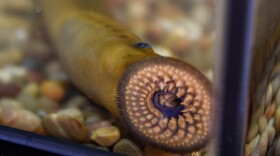-
Michigan's agriculture department wants public feedback on whether it should issue permits to allow the release of two types of weevils meant to control the spread of an invasive plant.
-
A look at the automotive industry in light of Michigan's tariff-sensitive economy. Also, more on the ICE detention and release of Hmong refugee Lue Yang.
-
Stateside’s April Baer chatted with a state forester about new species proposed for the Michigan invasive species list, and what you can do to foster native plants in your garden.
-
During the COVID-19 pandemic, the amount of sea lamprey in the Great Lakes surged because treatments were limited.
-
MSU Extension reported sightings of invasive jumping worms in parts of the state. They recommend inspecting home gardens and taking preventive measures.
-
We learned about the increase in measles cases in Windsor, an invasive species from the Great Lakes wreaking havoc in Japan, what’s behind the “muck” in Lake St. Clair, how wealth inequality destabilizes the world, and indigenous traditions for harvesting wild rice in Michigan.
-
As the city moves forward on plans to alter dams to restore rapids downtown, a new barrier could stop sea lamprey from spawning upstream.
-
The Michigan Department of Natural Resources is asking people to be on the lookout for damage caused by the invasive Asian Longhorned Beetle.
-
A trendy species of mushroom could be a new threat to Michigan’s forests.The golden oyster mushroom is native to Asia. But people here have been growing them for some time as they’ve become increasingly popular in recipes.It's possible some spores escaped into the wild.
-
The EPA is granting more than $2 million to the Great Lakes Fishery Commission to help address the invasive sea lamprey in Michigan waters.
Play Live Radio
Next Up:
0:00
0:00
Available On Air Stations









